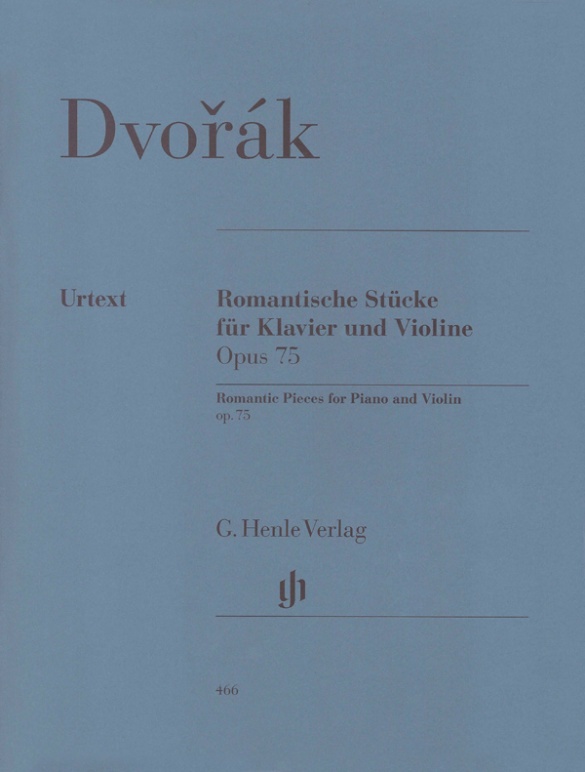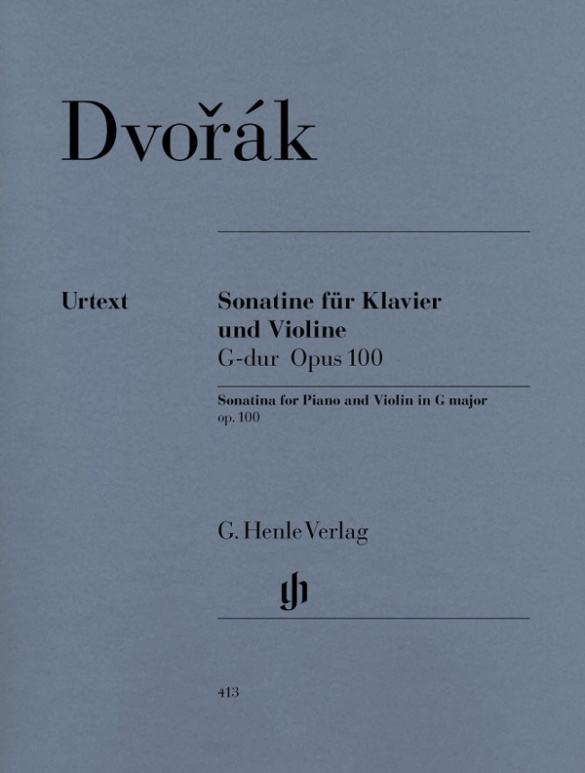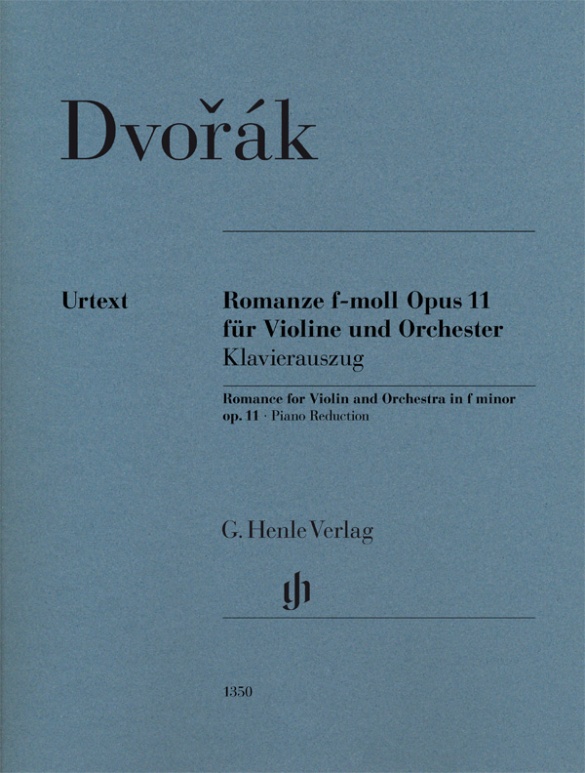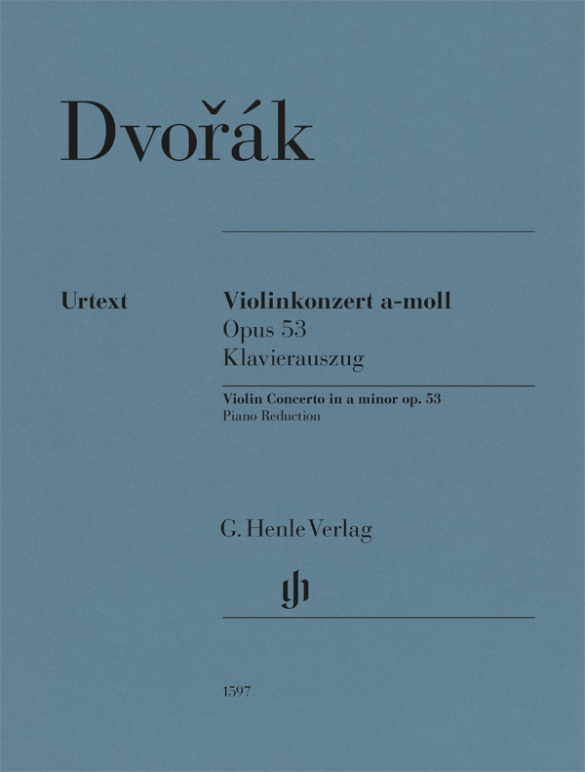

Antonín Dvorák
Violin Concerto a minor op. 53
Dvořák composed this concerto at his publisher’s suggestion. He drafted it relatively swiftly in summer 1879, but completing it was a more drawn-out process that lasted until 1882. He had the famous violinist Joseph Joachim look over the violin part, and also dedicated the concerto to him. But Joachim’s suggestions resulted in numerous reworkings, and he ultimately lost interest in the work. As a result, the world premiere was given by the Czech violinist František Ondříček.
This formally unusual work begins and ends with a sonata rondo, and adopts a Slavic tone throughout. After a lyrical middle movement it closes with lively Czech dance rhythms.
This Urtext edition draws on both the autograph and on the first editions of the score, solo part and piano reduction. The solo part has been marked up by one of the concerto’s most knowledgeable exponents, world-famous violinist Augustin Hadelich.
Content/Details
About the Composer
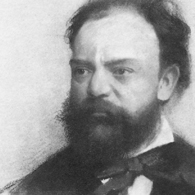
Antonín Dvorák
With Smetana he is the most famous Czech composer of the nineteenth century, contributing to the dissemination and appreciation of Czech music throughout the world. Among his around 200 works, encompassing all standard genres, are nine symphonies, fourteen string quartets, and twelve operas.
| 1841 | Born in Nelahozeves (Mühlhausen) on the Vltava River on September 8, the son of a butcher and innkeeper. |
| 1853 | Attends the training school in Zlonice; there he receives a comprehensive musical education from Josef Toman and the cantor Antonín Liehmann; subsequent education in Česká Kamenice (1856–57). |
| 1857–59 | Studies at the organ school in Prague. Until 1871 he will earn his living as a music teacher, organist, and violist. |
| 1861 | String Quintet No. 1 in A minor, considered his first work. |
| 1862 | Position as solo violist in the orchestra of the Bohemian Provisional Theater (conducted by Smetana, among others) |
| 1873 | Breakthrough with the premiere in Prague of his patriotic hymn “The Heirs of the White Mountain,” Op. 30. Employment at the private Prague School of Music. Several state scholarships. |
| 1874–77 | Organist at St. Adalbert church. |
| from 1876 | “Moravian Duets,” Opp. 20, 29, 32, and 38 (1876–77), “Slavonic Rhapsodies,” Op. 45 and the first series of “Slavonic Dances,” Op. 46 (both from 1878) enjoy great success. His fame abroad grows. |
| 1882 | Premiere of the opera “Dimitrij”, in the tradition of grand opera. |
| 1884 | First invitation to England, after which eight more will follow. |
| 1886 | Premiere of his oratorio “Saint Ludmila,” Op. 71. |
| 1891 | Professor of composition at the Prague Conservatory. |
| 1891–95 | Director of the National Conservatory of Music in New York. |
| 1893 | Premiere in New York of Symphony No. 9, “From the New World,” Op. 95 (American folkloric elements, cyclic techniques). |
| 1901 | Premiere in Prague of his most famous opera, “Rusalka.” |
| 1904 | Premiere in Prague of his last opera, “Armida.” Death in Prague on May 1. |
About the Authors

Peter Jost (Editor)
Dr. Peter Jost, born in 1960 in Diefflen/Saar, read musicology, German and comparative studies at Saarland University in Saarbrücken. He did his PhD in 1988 with a thesis on Robert Schumann’s Waldszenen.
From November 1991 to April 2009 he was a research associate at the Richard Wagner Complete Edition in Munich, and since May 2009 has been an editor at G. Henle Publishers. His Urtext editions comprise predominantly French music of the 19th and 20th centuries, including works by Lalo, Saint-Saëns and Ravel.
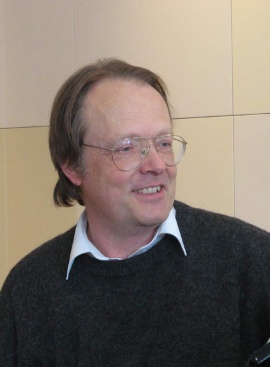
Johannes Umbreit (Piano reduction)
Prof. Johannes Umbreit studied the piano at the Musikhochschule in Munich. From 1987 onwards he was a regular accompanist at courses given by Wolfgang Schneiderhan, Thomas Brandis, Ljerko Spiller, Igor Ozim, Olga Woitowa, Ernő Sebestyén, Walter Nothas, F. Andrejevsky, Denis Zsigmondy and Zakhar Bron amongst others. He has appeared in numerous radio and TV broadcasts and plays chamber music with members of the Bavarian State Orchestra, the Munich Philharmonic Orchestra and the Bavarian Radio Symphony Orchestra.
He is on the jury of different international competitions and has been invited to several international music festivals. Umbreit was a teacher for almost ten years at the Musikhochschule in Munich and at the same time a lecturer for chamber music and piano accompaniment at the Richard Strauss Conservatory. Since 2008 he has been a lecturer at the Hochschule für Musik und Theater München. As the long-serving managing director of the Richard-Strauss-Gesellschaft, he was made an honorary member of the board in 2009. In May 2011, the Bavarian Minister of Culture appointed Johannes Umbreit an honorary professor of the Hochschule für Musik und Theater München on the suggestion of its academic senate.
Product Safety Informations (GPSR)

G. Henle Verlag
Here you can find the information about the manufacturer of the product.G. Henle Verlag e.K.
Forstenrieder Allee 122
81476 München
Germany
info@henle.de
www.henle.com
recommendations
autogenerated_cross_selling
Further editions of this title
Further editions of this title


